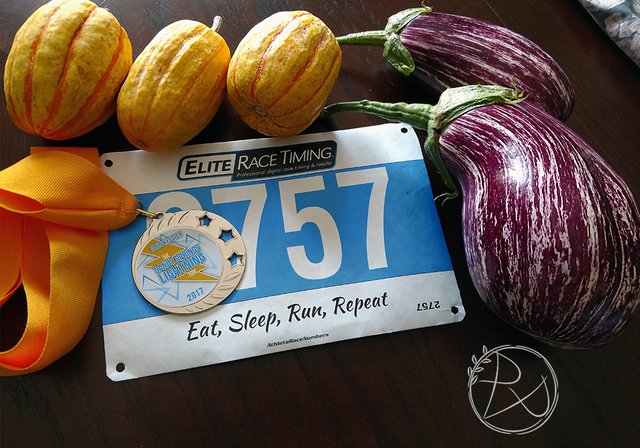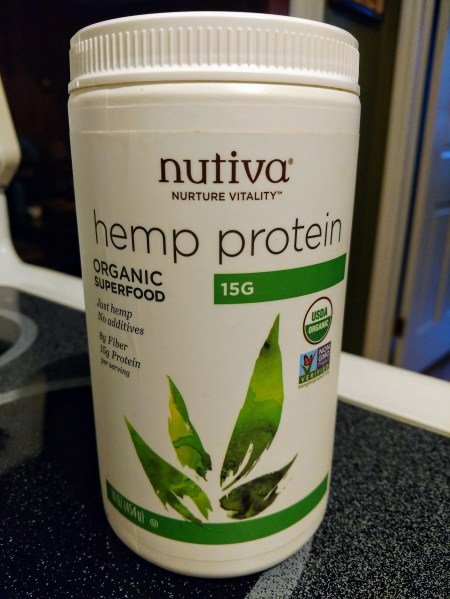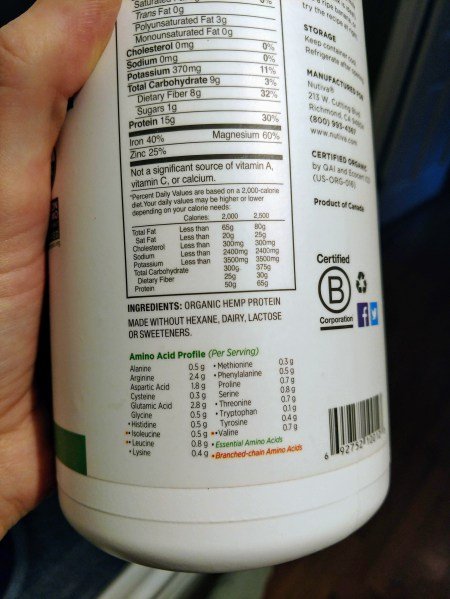Pros & Cons of Supplements for Runners {Protein Powder}

Hello there runners! I’m back this week with some more “food for thought” if you will on a topic I hear often in the fitness community. “What protein powder should I use?” is even more common than “Should I use protein powder?” in my experience. The common conception (or misconception) is that if you are an active individual you need certain supplements to continue to function at your peak. I will try to touch on some more common ones in future articles, but I thought that protein was a big enough topic to justify a full article.
First off, what is protein and why do we need it? Protein is one of the three macronutrients that provide energy for the body (carbohydrates and fat being the other two). Technically it is not protein as a whole that the body needs, but rather the amino acids that protein is comprised of. There are 20 different amino acids, broken up into essential and nonessential types. The nonessential amino acids can be made by the body as long as it has enough of the components to put it together, while the others (9 of them) have to be consumed in your diet as the body cannot make them on its own.
Obviously most of us know that muscles are made up of a good percentage of protein, but many other bodily structures like tendons and ligaments, hair, and parts of the bones and teeth also contain a good percentage of protein. The amino acids play a large role in energy metabolism, enzyme activity, and hormone regulation. Suffice to say, there is a reason it is one of the “macro”nutrients—the body needs it to function properly.
However, the amount that we actually need to consume is often way overblown when you look at resources on the internet, especially in the fitness community. Current RDA (Recommended Daily Allowance) here in the United States is .8 grams of protein per kilogram of body weight for the average person. Of course the total amount of protein you need depends on a lot of factors like how active you are, how much lean mass you have, and even the quality of protein you consume. Ideally that amount is also based on a healthy body weight, so if you are significantly overweight you would want to use the percentage of your ideal weight based on your height and frame to calculate your needs. Athletes do tend to need more than the average person in part just because we need slightly higher caloric intake, but also to help ensure proper recovery and healing of the muscles and connective tissue.

Do we need protein powder, though? My answer would be a no to that specific question. Generally if you are healthy and eating a well-balanced diet you do not need to supplement with a powder as real food contains enough of the needed amino acids. Even vegans generally do not have any issues consuming enough protein from a balanced plant-based diet. Of course animal products like meat and eggs contain protein, but you can also find it in beans and other legumes, nuts, seeds, tofu, tempeh, and even most vegetables contain a small percentage which can add up throughout the day. Can it be helpful for some people? Yes, I think for certain athletes in particular it can supplement a healthy diet. Men have a higher need based on a larger percentage of lean mass and caloric needs, so adding in a high-quality protein powder may help if you struggle to eat enough throughout the day. Highly active women may also benefit from adding in protein powder to a shake or oatmeal if they also seem to have trouble eating enough or notice trouble recovering from runs or other workouts. Anyone who is reducing their overall caloric intake to try to lose a bit of body fat may also need a slightly higher percentage of protein to ensure proper levels of nutrients.
I would advise some caution though as far as possible negative impacts of taking any supplements. First off, look at the source. There are so many different types of protein powders—whey, casein, soy, hemp, pea, egg, rice and the list goes on. Ideally if taking a supplement you want to make sure it is of a high quality source (organic if possible, ethically sourced, certified by a national nutrition administration) with little to no added fillers, sweeteners, artificial flavors or colors. The problem with a lot of the protein powders is that they have a lot of junk added to make them palatable. People also tend to use them as a main food source instead of as an actual supplement to a healthy diet. There is still a lot of research needing to be done as to whether your body processes a powder the same as eating an actual soybean (though I think most points to it does not).

I’ll add in one of my personal pet peeves here in the cons, as well: putting protein powder in anything to make it “healthy”. Protein cupcakes, high-protein candy bars, protein pancakes, and for goodness sake I’ve even seen an article about high-protein beer! For one, just because you jam a bunch of protein into something doesn’t make it automatically healthier (especially if it still has plenty of sugar or other refined ingredients). Secondly, it vilifies the original item that may actually not be that bad if you make it with wholesome ingredients. And lastly, it may lull you into a sense that you can eat as much as you want without it being bad for you. Protein is an important macronutrient, but it is not a food group on its own so remember to incorporate healthy whole foods of all varieties and makeups.
So the final verdict: choose real food first, but find what is best for you and your lifestyle. If you feel like you have a hard time fitting in enough protein from whole foods throughout the day or seem to have trouble recovering from your workouts, then perhaps investing in a quality protein powder may help to boost your intake and fill whatever hole might be in your current diet. You may prefer to use it when you are training harder or running longer, but then reduce your use of it when you are in an off-season or are less active. I know there are some days where people just get busy and have a hard time sitting down for a full meal, so having something quick can sometimes help on those crazy days, as well. Nutrition is a very individual thing, so ultimately if you pay attention to how you feel then you will know best what your body needs!
Any of my runners or other athletes out there have success using protein powder to enhance their amino acid intake? Or on the flip side, any of you who feel like it is not necessary? Personally I tried a number of different ones years ago when I first got into the fitness world, but after lots of research and personal observation I realized I don’t need it to perform my best if I am eating optimally. I also like to eat and would rather spend money on whole food, so some of it just stems from my budget and desire to leave as many calories available in my daily allowance to nosh on delicious plants! ;)
For more information about @runningproject please see the latest status report: https://steemit.com/runningproject/@runningproject/the-steem-running-project-9th-status-report-runningproject-has-reached-300-sp
Or a few ways to support your favorite initiative: https://steemit.com/runningproject/@runningproject/the-steem-running-project-how-can-you-help-to-the-runningproject-initiative
The latest gear update here: https://steemit.com/runningproject/@runningproject/another-very-important-addition
Posted by @plantstoplanks on behalf of the @runningproject
@plantstoplanks, thanks for this interesting article.
I live vegetarian, but I think that my whole-food diet provides me with enough protein for my daily needs.
However, I have noticed that taking protein powder after hard training sessions or competitions (e.g. marathon) helps me to regenerate. In concrete terms, it relieves or prevents sore muscles in me.
I use vegetable protein powder (peas & rice) for such special events mostly in a fruit smoothie. This gives me additional vitamins and antioxidants to support regeneration.
Harald from Team EULE
I think that is a great way to utilize it to enhance your usual good eating routine! I know of a few others who have had similar results supplementing in that manner. The last time I used any it was the hemp protein (the one in my pictures), but I have used pea & rice versions, as well. A few of the trainers that I work with really like the Vega brand which has a blend of vegetable sources. Now if I want a boost I'll just add shelled hemp seeds to give me a little extra protein to my smoothies, oats or salad.
Thanks for the great feedback and sharing your experience!
I use peas and rice protein powder because this combination contains all essential amino acids.
But now I'm going to have a look at hemp seeds too.
I think hemp may be a little light on lysine, but otherwise a very solid source of vegetarian protein! It also has a good omega 3 to omega 6 ration which is great for inflammation. :)
@runningproject
It might be good.
But I am completely against supplements
I can absolutely respect that @anishag! We have survived for most of human existence without them. It is a common question for athletes, so I thought it was a good subject to at least bring up and start some dialogue. Thanks for sharing your thoughts!
Congratulations! Your post has been selected as a daily Steemit truffle! It is listed on rank 19 of all contributions awarded today. You can find the TOP DAILY TRUFFLE PICKS HERE.
I upvoted your contribution because to my mind your post is at least 8 SBD worth and should receive 95 votes. It's now up to the lovely Steemit community to make this come true.
I am
TrufflePig, an Artificial Intelligence Bot that helps minnows and content curators using Machine Learning. If you are curious how I select content, you can find an explanation here!Have a nice day and sincerely yours,

TrufflePigThank you!
nice your buddy post is very good my tolog me new in steemit. @adit123
Thanks for stopping by the @runningproject! Are you a runner @adit123?